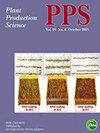Varietal difference in dynamics of non-structural carbohydrates in nodal segments of stem in two varieties of rice (Oryza sativa L.) at pre- and post-heading stages
IF 1.3
3区 农林科学
Q2 AGRONOMY
引用次数: 3
Abstract
ABSTRACT The non-structural carbohydrate (NSC) stored in rice stems (culm plus leaf sheaths) at pre-heading stage is one of the major carbon sources for grain filling. In this study, we conducted field experiments in 2018 and 2019 using two varieties, Momiroman (japonica-dominant) and Teqing (indica), which have different accumulation and remobilization patterns of NSC in the stems. We analyzed NSC dynamics of each of the five nodal segments of internodes and leaf sheaths at pre- and post-heading stages. The dynamics of NSC at pre- and post-heading stages differed among segments. The lower segments of internodes and leaf sheaths accumulated more NSC at pre-heading stage compared to the upper segments in both varieties. The lower internodes in Teqing were morphologically larger than in Momiroman and would be able to store more NSC. However, the upper parts of the stems required biomass for development and formation at the stage of NSC accumulation in stems. Momiroman had longer upper internodes and leaf sheaths and required more biomass than Teqing. The NSC remobilization was later in the upper than the lower internodes for both varieties, which led to the delay of NSC remobilization in the entire culm after heading. These results indicated that ideal morphology of stems, to maximize the potential contribution of stem NSC as the carbon source for grain filling, is large lower internodes and short upper internodes and leaf sheaths. Graphical Abstract两个水稻品种抽穗前后茎节段非结构性碳水化合物动态的差异
水稻抽穗前期茎(秆加叶鞘)中储存的非结构碳水化合物(NSC)是籽粒灌浆的主要碳源之一。在本研究中,我们在2018年和2019年使用两个品种Momiroman(粳稻显性)和Teqing(籼稻)进行了田间试验,这两个品种在茎中具有不同的NSC积累和再活化模式。我们分析了抽穗前后节间和叶鞘五个节段中每一个节段的NSC动态。不同节段的NSC在抽穗前和抽穗后阶段的动态不同。两个品种的节间和叶鞘下部节段在抽穗前阶段比上部节段积累了更多的NSC。特庆的下部节间在形态上比莫米罗曼大,能够储存更多的NSC。然而,在NSC在茎中积累的阶段,茎的上部需要生物量来发育和形成。Momiroman的上部节间和叶鞘比Teqing长,需要更多的生物量。两个品种的NSC在上部节间的再活化晚于下部节间,这导致抽穗后整个秆的NSC再活化延迟。这些结果表明,为了最大限度地发挥茎NSC作为籽粒灌浆碳源的潜在贡献,茎的理想形态是大的下部节间和短的上部节间和叶鞘。图形摘要
本文章由计算机程序翻译,如有差异,请以英文原文为准。
求助全文
约1分钟内获得全文
求助全文
来源期刊

Plant Production Science
农林科学-农艺学
CiteScore
5.10
自引率
4.00%
发文量
27
审稿时长
>36 weeks
期刊介绍:
Plant Production Science publishes original research reports on field crops and resource plants, their production and related subjects, covering a wide range of sciences; physiology, biotechnology, morphology, ecology, cropping system, production technology and post harvest management. Studies on plant production with special attention to resource management and the environment are also welcome. Field surveys on cropping or farming system are also accepted. Articles with a background in other research areas such as soil science, meteorology, biometry, product process and plant protection will be accepted as long as they are significantly related to plant production.
 求助内容:
求助内容: 应助结果提醒方式:
应助结果提醒方式:


